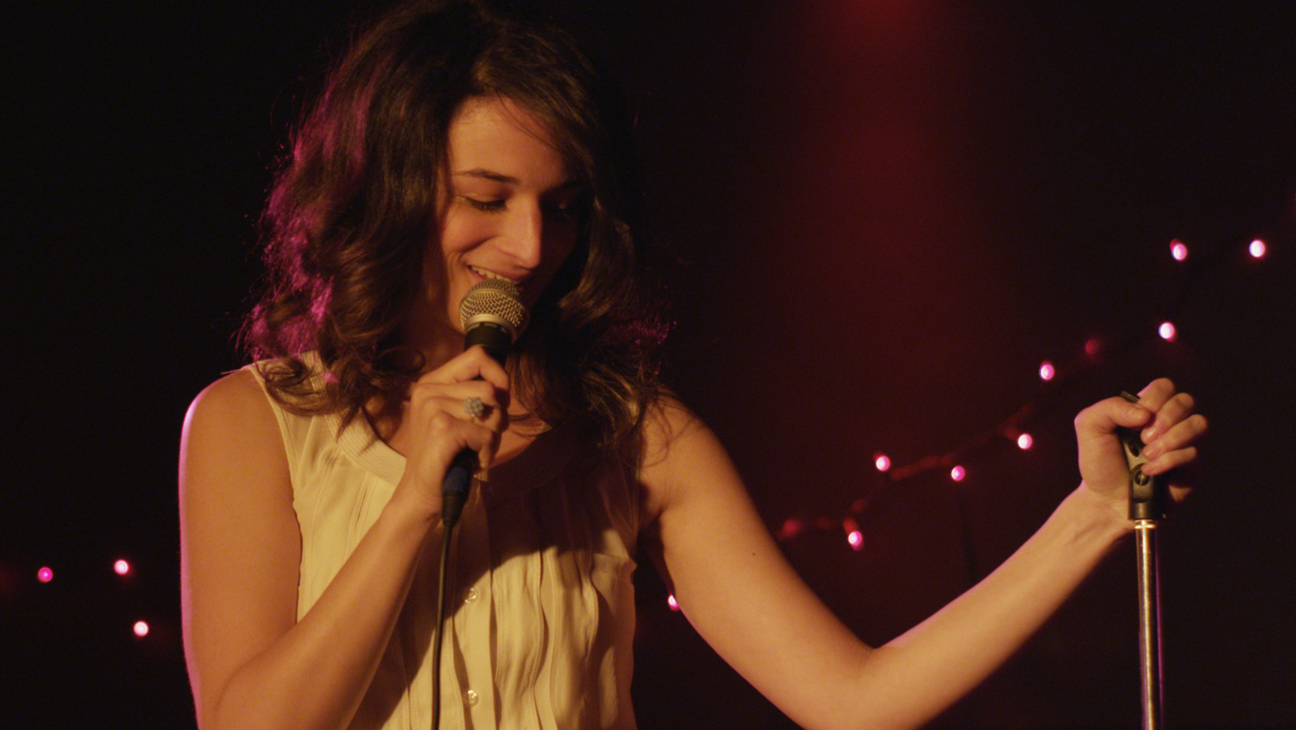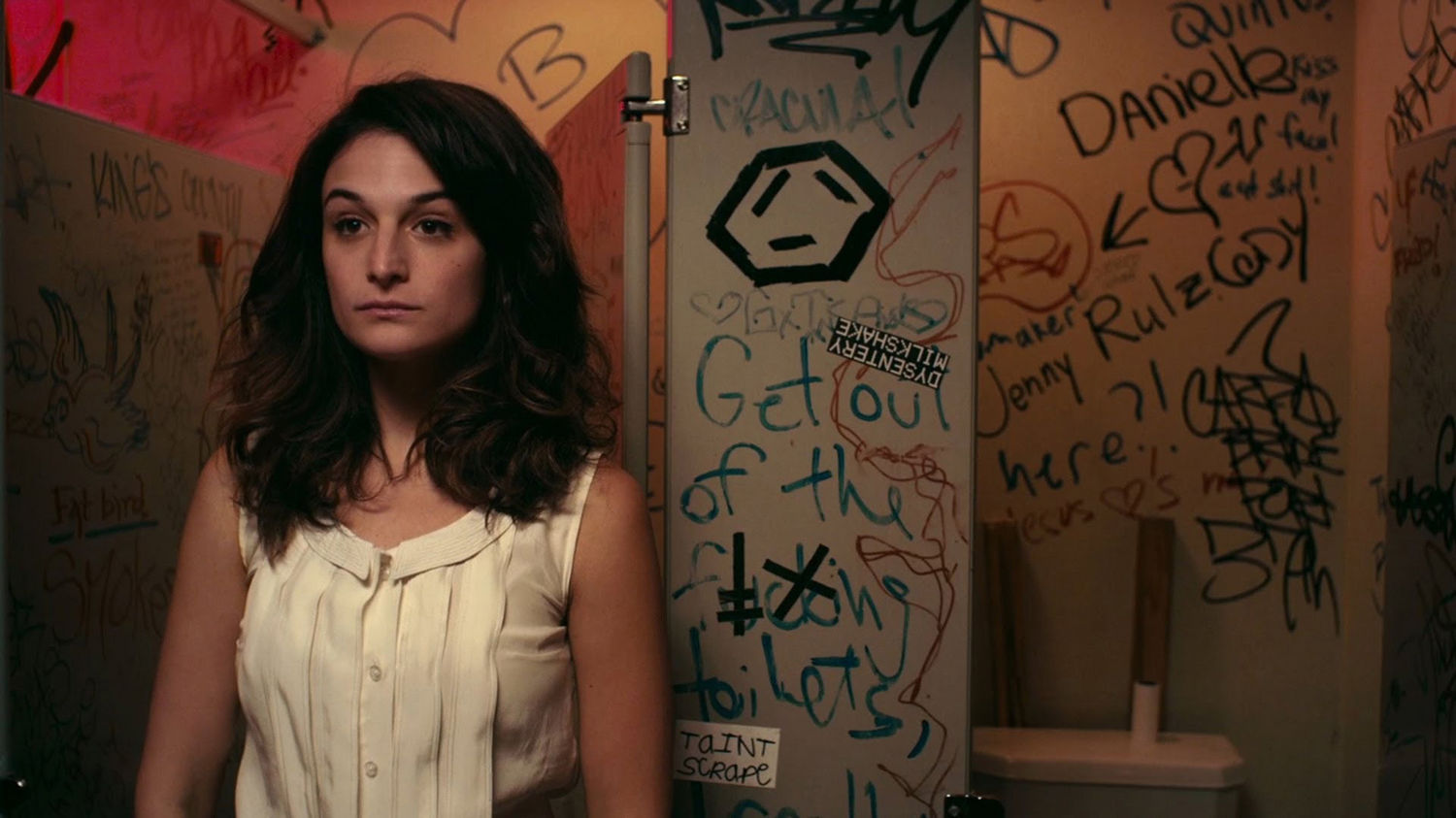One of the most prominent tropes in comedy these days is the woman who "goes there." Stand-up comedian Sarah Silverman delivers one-liners about rape and the Holocaust. Girls creator Lena Dunham spends a third of each episode in some state of undress. The leading ladies in Amy Poehler's new TV series Broad City hide marijuana in their nether regions.
And Obvious Child, the indie comedy starring former Saturday Night Life cast member Jenny Slate, opens with Slate's character describing herself as the sexual product of a menorah and '90s pop singer Natalie Imbruglia.
Anything men can do crassly, women can do crasser.
 A24
A24Beneath these women's bare-all presentation, though, is often a very vulnerable person fumbling her way through life. Such is the case in Obvious Child, Gillian Robespierre's directorial debut, described as "a romantic comedy about abortion."
Given the tagline, I walked into the screening in Chicago this week expecting to dislike it. Not only because it seemed poised to treat abortion as a minor thing, but also because the trailer featured two characters dancing in their underwear to catchy indie pop. (Unless you are in 2004 and are Eternal Sunshine of the Spotless Mind or a Jimmy Eat World music video, you can't lead with the hipsters-dancing-in-underwear motif. You just can't.)
But I walked out of the screening wondering what it means to appreciate a story whose moral and spiritual assumptions nonetheless clash with the Christian tradition's, as well as my own.
It first must be said that Obvious Child refers not to an unborn baby but to Donna Stern, a 27-year-old Brooklynite who is thoroughly unprepared for adulthood. Donna works part-time at the Unoppressive Non-Imperialist Bargain Books (an actual bookstore in NYC's West Village), drinks a lot, and doesn't know how to file her taxes.
"You're wasting your 780 verbal SAT score telling jokes about diarrhea," says Donna's mother (Polly Draper), a stern business professor who at one point creates an Excel spreadsheet to help Donna consider new job prospects. Her mom is not the most likeable character, but on this point she's right: Shouldn't potty jokes end with adolescence?
After Donna is "dumped up with" by a cheating boyfriend, she has a one-night stand with a kind, gentlemanly Max (Jake Lacy), whom she meets at the bar where she's just bombed a standup routine. Enter the dancing-in-underwear scene, and you can probably guess what Donna finds out three weeks later.
 A24
A24Jenny Slate is best known for her one-year stint on SNL before creating the cute-overload series "Marcel the Shell with Shoes On," as well as playing John Ralphio's sister Mona Lisa on Parks and Recreation. She's fittingly cast here, playing Donna detached and irreverent in one scene, confessional and needy in the next.
"I have a softer side that I'd like to explore in my work," she told Interview magazine. "I had this notion of showing a woman who is both confident enough to go onstage and not let anything be held back, and also what it's like for her in her private time."
The strongest moments of Obvious Child are actually Donna's weakest—when she curls up in her mom's bed after a misfire with Max; or when she sits cramped up in a cardboard box, staring into space while friend Nellie (Gaby Hoffmann, who really deserves more screen time) packs up non-imperialist books. Donna is not the hardened ideologue we might expect in a movie that treats abortion so casually. Her decision to have an abortion arises of functional need, not a surveyed moral landscape that concludes it would be the best, responsible decision at this point in her life. Instead, she's simply a young woman in a mess, making one bad, drunken decision, then making another decision that rectifies the first.
In this way, Obvious Child is the anti-Juno—the charming 2007 movie in which sardonic teenager (Ellen Page) has a baby after sleeping with friend Paulie Bleeker. While Juno was praised by many pro-life groups (including Christianity Today), the movie never actually makes an argument for the personhood or dignity of the unborn child. Instead, Juno's decision to have the baby is functional, a logical step that will benefit a couple who wants to adopt.
The same is true of Knocked Up, the crass 2007 Judd Apatow movie in which Alison Scott (Katherine Heigl) moves forward with a pregnancy despite her mother's insistence she "take care of it" after sleeping with sweet stoner Ben Stone (Seth Rogen). There's not much ethical deliberation. "There was a slew of movies in 2007 which I enjoyed, but they all dealt with unplanned pregnancy with having the baby at the end," Robespierre told Salon. "And it wasn't the story that rang true to me or people that I knew." The director (who's working on a comedy about divorce) wanted to show that abortion doesn't have to "leave an emotional scar."
 A24
A24On such a contentious issue as abortion—which, it's worth repeating, has been legal in the United States for only 40 years—Robespierre might have been more overt in her aims: telling a story about corrupt pro-life activists, or kind abortion doctors who see their work as "community service," or a judge who carries the deciding vote on overturning Roe v. Wade.
Instead, Obvious Child tries to remain apolitical, following Donna Stern's personal growth and budding relationship with Max, rather than the abortion as such. The "procedure" is discussed openly only a few times, and the movie ends on a sweet note, with Donna and Max cuddled on a couch watching Gone with the Wind. (For a movie pitched as "honest" and "authentic," I do have to wonder how many women can realistically expect romance to blossom with the father after an abortion. The film's ending smelled an awful lot like more Hollywood "true love" claptrap.)
But make no mistake: Obvious Child wants viewers to see that abortion is normal—sad, to be sure, but not the morally fraught decision that most people intuit it is, or the emotional crisis that many women who have had an abortion say it is. The film may not be overtly political, but it is assuredly pro-choice. Strikingly, there's no mention of a fetus, much less an unborn person. The only time Donna breaks down is when she finds out having the abortion will cost $500.
And every woman in the movie—Donna, her mother, and Nellie—has had one. Carrying a baby to term simply seems beyond the imaginative bounds of Donna's world, just as having an abortion seemed beyond the imaginative bounds of the leads in Juno and Knocked Up.
In a box-office culture in which ideological battles are embedded in story—in an embodied character whose crises and well-being we viewers come to care about—Christians are wise to pay attention to Obvious Child and stories like it. They may not reflect the world as we hope it would be, a world where the most vulnerable persons, including the unborn, are protected by law and cherished by the people who create them.
But such stories certainly reflect a swath of the world we inhabit, and therefore a swath of our neighbors. If mature, discerning viewers can stomach Donna Stern "going there," I'd recommend Obvious Child to them. While I ultimately disagree with Robespierre's political aims, at the least she has provided a sometimes funny, often tender portrait of many (though not all) women who face an unplanned pregnancy.
Since we as the church are called to love women like Donna Stern, first we need to understand their hopes, dreams, fears, and obstacles. Then, after developing an authentic relationship, we might help them envision a better way.
Caveat Spectator
Obvious Child is rated R for crass and consistent talk about bodily functions, sexual and scatological. The dialogue is peppered with profanity, including many creative uses of the f word. Sex outside marriage is considered normal for all characters, and given the topic at hand, it's discussed openly and frequently. We viewers see the "before" and "after" scenes of two characters having sex. We do not see them having intercourse, though we see them in their underwear. There is no male or female nudity, however. We also see the lead character being given a sedative before her abortion. The implication is clear and somewhat disturbing. Perhaps more disturbing, there are a couple irreverent jokes about the abortion, as the lead character tries to make light of a heavy situation. In one scene we see the lead character drink too much alcohol, and most characters imbibe throughout. The film is unsuitable for children or adolescents, and may be unsuitable for some adults as well.
Katelyn Beaty is Christianity Today's managing editor.












